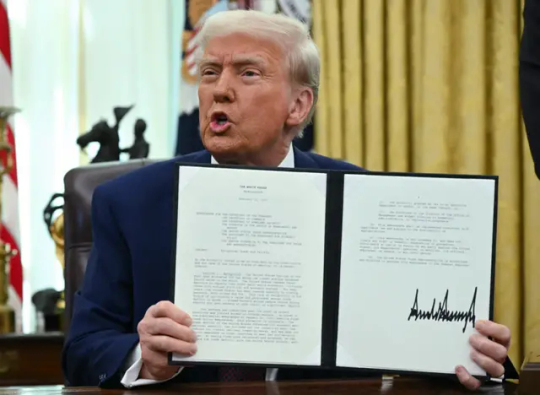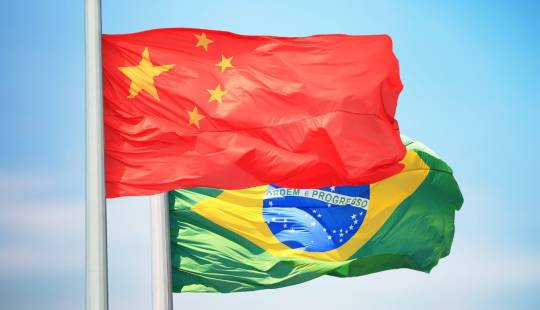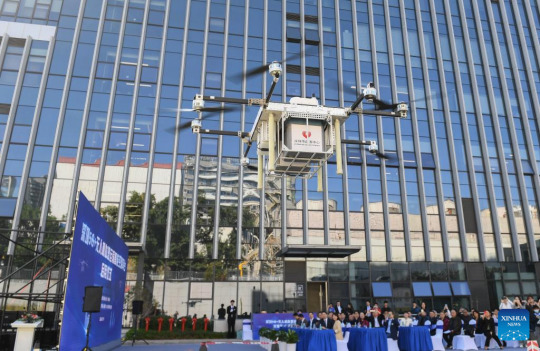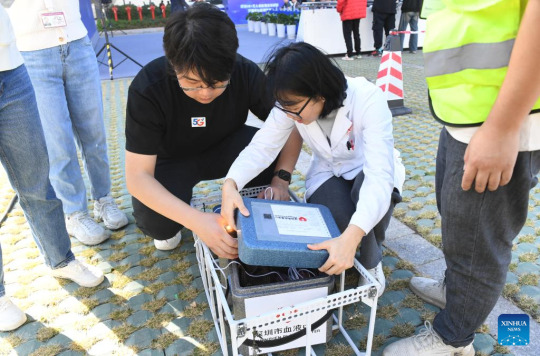#chinese politics
Explore tagged Tumblr posts
Text
China emphasizes partnership with Brazil to overcome US trade war

“China will work with Brazil to (…) exercise true multilateralism, guarantee the UN’s central role and defend the legitimate rights and interests of Global South countries,” said Chinese Foreign Ministry spokesman Guo Jiakun, when answering Brasil de Fato/TVT about whether talks had begun between Brazil and China or within BRICS to confront the wave of tariffs initiated by the Trump administration in the United States.
The new US government’s policy of tariffs has targeted both countries. In the case of China, 10% tariffs have been applied to imports of all Chinese products. Brazil is likely to be affected by 25% tariffs on all steel and aluminum the US imports. President Lula has said that he will react to Trump’s steel tax. Last Friday (14), Lula told Rádio Clube do Pará that Brazil would complain to the WTO or tax US products.
The Chinese foreign ministry spokesman also said that “China supports Brazil’s BRICS presidency and will jointly advance further BRICS cooperation”. He added that “as two major countries in the world and representative members of the Global South, China and Brazil have maintained our strategic determination and made active contributions to global peace, stability and development together in a volatile and turbulent world.”
Continue reading.
#brazil#brazilian politics#politics#united states#china#chinese politics#economy#geopolitics#image description in alt#mod nise da silveira
33 notes
·
View notes
Text








#current events#social justice#human rights#yemen#tel aviv#jerusalem#palestine 🇵🇸#iran#syria#west bank#middle east#china#political#political posting#politics#chinese politics#world politics#solidarity with palestine#solidarity with gaza#free palestine#free gaza#gaza#gaza strip#palestine#gaza genocide#gazaunderattack#save gaza#gaza news#palestine news#all eyes on palestine
52 notes
·
View notes
Text
Speaking at a regular press conference on March 10, Chinese Foreign Ministry spokeswoman Mao Ning congratulated Mr Carney on his win, while urging Canada to work with China to promote improvement and development of relations. “We expect Canada to adhere to an objective and rational understanding of China and pursue a positive and pragmatic policy towards China,” Ms Mao said on March 10.
Unlikely under the Liberals (derogatory), but perhaps the nonsense with Prez Trump will lead to changes?
6 notes
·
View notes
Text
Seismologists recorded 515 aftershocks after earthquake in Tibet
Chinese seismologists have recorded more than 500 aftershocks following an earthquake in the Tibet Autonomous Region in southwest China, Chinese Central Television reported.
The centre said in a statement:
“As of 8:00 a.m. on January 8, a total of 515 aftershocks have been recorded, including 488 aftershocks of magnitude below 3.0, 27 aftershocks of magnitude 3.0 and above, notably 24 of magnitude 3.0 to 3.9 and three of magnitude 4.0 to 4.9. The maximum aftershock of magnitude 4.4 was recorded about 18 kilometres from the epicentre of the main shock.”
The magnitude 6.8 earthquake struck at 09:05 local time in Tingri county in Tibet Autonomous Region in southwest China, near the border with Nepal.
The epicentre of the tremors was 163 km from the city of Shigajie with a population of about 800,000 people, its depth was about 10 km, the US Geological Survey reported. At least 126 people died, 188 were injured and over 3,000 buildings were damaged.
Read more HERE

10 notes
·
View notes
Text
I last saw my old professor Abduqadir Jalalidin at his Urumqi apartment in late 2016. Over home-pulled laghman noodles and a couple of bottles of Chinese liquor, we talked and laughed about everything from Uighur literature to American politics. Several years earlier, when I had defended my master’s thesis on Uighur poetry, Jalalidin, himself a famous poet, had sat across from me and asked hard questions. Now we were just friends.
It was a memorable evening, one I’ve thought about many times since learning in early 2018 that Jalalidin had been sent, along with more than a million other Uighurs, to China’s internment camps.
As with my other friends and colleagues who have disappeared into this vast, secretive gulag, months stretched into years with no word from Jalalidin. And then, late this summer, the silence broke. Even in the camps, I learned, my old professor had continued writing poetry. Other inmates had committed his new poems to memory and had managed to transmit one of them beyond the camp gates.
In this forgotten place I have no lover’s touch Each night brings darker dreams, I have no amulet My life is all I ask, I have no other thirst These silent thoughts torment, I have no way to hope
Who I once was, what I’ve become, I cannot know Who could I tell my heart’s desires, I cannot say My love, the temper of the fates I cannot guess I long to go to you, I have no strength to move
Through cracks and crevices I’ve watched the seasons change For news of you I’ve looked in vain to buds and flowers To the marrow of my bones I’ve ached to be with you What road led here, why do I have no road back home
Jalalidin’s poem is powerful testimony to a continuing catastrophe in China’s Xinjiang Uighur Autonomous Region. Since 2017, the Chinese state has swept a growing proportion of its Uighur population, along with other Muslim minorities, into an expanding system of camps, prisons and forced labor facilities. A mass sterilization campaign has targeted Uighur women, and the discovery of a multi-ton shipment of human hair from the region, most likely originating from the camps, evokes humanity’s darkest hours.
But my professor’s poem is also testimony to Uighurs’ unique use of poetry as a means of communal survival. Against overwhelming state violence, one might imagine that poetry would offer little recourse. Yet for many Uighurs — including those who risked sharing Jalalidin’s poem — poetry has a power and importance inconceivable in the American context.
#current events#poetry#politics#chinese politics#oppression#censorship#resistance#imprisonment#uyghur genocide#china#xinjiang#uyghurs#abduqadir jalalidin
184 notes
·
View notes
Text
I'm have a strong hatred for all of them.
5 notes
·
View notes
Text
Do you ever read a case of censorship so ludicrous that you feel like you slipped into an parody alternate universe
To evade censorship on the internet, Chinese resort to code words — so much so that academics and writers lament the deterioration of the Chinese language. Young people often use abbreviations of Pinyin, the Romanized spelling of Chinese characters, for anything that can be construed as sensitive or taboo. I’ve seen Chinese criticizing my columns about the Chinese government by saying they loved their “zf,” abbreviation for Zhengfu, or government. Even when defending the state, they knew they were venturing into treacherous terrains.
- Li Yuan
13 notes
·
View notes
Text
So I decided to skim IRL Jackie Chan's Wikipedia page and just... Oh nooooooooooo! He's anti-democracy, pro-Beijing when it comes to Hong Kong politics! That's very sad for me... Quite a shame... But I guess that's just what happens when you get rich... Still, I suppose that I can respect his work and what he's done for the film industry as a whole and not like his politics at the same time. A shame for me for certain, but I guess that I can't exactly blame the man. He probably has his reasons and is ultimately just a person with his own thoughts, feelings, and opinions, even if I disagree with them. :/
But in my heart of hearts, the Jackie Chan in the cartoon version of him from Jackie Chan Adventures is pro-democracy. I can believe that in my heart. :p
(For the record, in terms of Hong Kong politics, I tend to be on the side of the people who live in an area getting to determine how they want to be led. And given the mass protest movements within the last 10 years, it seems that Hong Kong wants to maintain their democracy and be allowed to conduct their own affairs separate from the mainland and am very disappointed and angry at both China for violating the treaty that gave them Hong Kong, and for England for not enforcing their treaty. I do not think that it's a stretch to say that what China has been doing to Hong Kong is an act of colonization and I am generally against colonization. :/ I may not talk about it a lot but I DO care about politics, especially when it comes to Hong Kong.)
#jackie chan adventures#jackie chan#hong kong politics#politics#hk politics#chinese politics#maniac gets political#maniac's opinions
4 notes
·
View notes
Text
The junk and the jangada: a route for academic collaboration between China and Brazil

The University of São Paulo (USP), a leader in scientific production in Latin America, and China, a global power in science and technology, share a common vision: That research and academic collaboration are the foundations for building a more equitable, sustainable, and innovative future.
This synergy takes shape at the USP-China Center, a strategic initiative of the USP President’s Office, aiming to strengthen the dialogue between the two nations, whose contributions to science and culture transcend borders.
This movement towards rapprochement takes place at a unique moment in the world’s geopolitical overlook, with territorial disputes and armed conflicts in different regions around the world and the recent victory of protectionist projects in countries with regional and global influence. In a recent article on Folha de S. Paulo Chinese President Xi Jinping invited Brazil to sail together with his country “under full sail”. But how can the Chinese junk and the Brazilian jangada sail together quickly and safely in such turbulent geopolitical seas? The way to go seems to be cooperation and multilateralism in academic relations.
China is Brazil’s main trading partner, and bilateral trade reached US$110 billion in 2024, resulting in a surplus of US$29 billion for Brazil. But the partnership between the two countries goes beyond trade and has immense potential in the academic sphere. China, a global leader in areas such as data science and engineering, finds in Brazil, with its expertise in sustainability, biodiversity, agriculture, and food safety, a partner of complementary strengths.
However, the enormous potential of the Chinese Brazilian partnership in science and technology faces substantial challenges. Language and cultural barriers still hinder academic exchange, and geographical distance imposes high costs on students’ and researchers’ mobility. In addition, the administrative centralization of Chinese institutions contrasts with the fragmentation of the Brazilian academic system, requiring coordinated efforts from both sides for more dynamic academic collaboration between the institutions of the two countries to flourish.
Continue reading.
#brazil#brazilian politics#politics#china#science#chinese politics#international politics#image description in alt#mod nise da silveira
8 notes
·
View notes
Text
Fate has placed Taiwan and Ukraine in similar positions. Both have giant neighbors who once ruled them as imperial possessions. Both have undergone democratic transformations and have thus become an ideological danger to the autocrats who covet their territory. Just as Putin has made the erasure of Ukraine’s sovereignty central to his political project, Xi has vowed to unify China and Taiwan, by force if necessary. Secretary of State Antony Blinken warned in October that China may be working on a “much faster timeline” for dealing—somehow—with Taiwan. U.S. military and intelligence leaders have pointed to 2027 as a potential time frame for an invasion, believing that China’s military modernization will have advanced sufficiently by then.
— Taiwan Wants China to Think Twice About an Invasion
#ben rhodes#taiwan wants china to think twice about an invasion#current events#politics#taiwanese politics#chinese politics#imperialism#intelligence#russo-ukrainian war#2022 russian invasion of ukraine#taiwan#ukraine#china#russia#antony blinken
136 notes
·
View notes
Text
Will the Canadian Liberal overcome their racism and red scare addiction to actually make good economic policy? Probably Not, but one can hope.
#Canada#People's Republic of China#social justice#red scare is one hell of a drug#canadian politics#chinese politics
3 notes
·
View notes
Text







🇨🇳 🏨 🚨 CHINA IMPLEMENTS DRONE PROGRAM FOR BLOOD TRANSPORTATION IN SHENZHEN PROVINCE
📸 Photos from the implementation of a new drone transportation platform for blood transfusion emergencies at the Shenzhen Blood Center in Shenzhen, in the southern Chinese province of Guangdong.
The new program was implemented by the Shenzhen Blood Center and is seen here being used for the transportation of blood from the Shenzhen Traditional Chinese Medicine Hospital for the first time on Friday, January 19th, 2024.
Integrating both Artificial Intelligence (AI) and 5G communications technology, the new platform is said to help "ensure safety and improved efficiency of blood transportation," according to an article published in China's Xinhua News Agency.
#source
@WorkerSolidarityNews
#china#china news#chinese news#blood transportation#blood transfusion#medical news#technology#tech news#news in china#politics#news#geopolitics#world news#global news#international news#breaking news#current events#medical technology#medicine in china#chinese politics
4 notes
·
View notes
Text
China to launch mission to moon’s “hidden” side
China would launch a robotic spacecraft on a round trip to the back side of the moon in the coming days, Reuters reported.
The journey will be the first of three technically challenging missions paving the way for the first landing of a Chinese crew and the establishment of a base at the lunar south pole.
Since the first Chang’e mission in 2007, named after the mythical Chinese moon goddess, China has made great strides in lunar exploration, narrowing the technological gap with the United States and Russia.
In 2020, China brought back samples from the near side of the moon for the first time in over forty years. The mission verified that the country could safely return an unmanned spacecraft to Earth from the lunar surface.
China is expected to launch Chang’e-6 this week using the 2020 mission’s backup spacecraft and collect soil and rocks from the moon’s back side, which is permanently facing away from Earth.
With no direct line of sight to Earth, Chang’e-6 will rely on the recently launched relay satellite orbiting the moon. The same satellite will support the unmanned Chang’e-7 and 8 missions in 2026 and 2028 respectively, when China will begin exploring the south pole in search of water and building a rudimentary outpost with Russia.
China aims to send its astronauts to the moon by 2030.
Read more HERE

#world news#world politics#news#china#china 2024#china news#chinese politics#astronaut#astronomy#astronews#sailor moon#hidden side
17 notes
·
View notes
Text
For those that may need to hear it again:
👏BEING👏FROM👏AN👏IMPERFECT👏NATION👏DOES👏NOT👏MEAN👏CRITICISMS👏ARE👏INVALID👏
The number of times I've seen "oh the X has room to talk, not like they have done (bad thing)" sarcastically is upsetting
I can rail against the Chinese genocide against the Uyghurs, and I expect you to rail against my countries disgusting (some would say genocidal) treatment of migrants, as you should because it's disgusting that it occurs, but it doesn't mean that as an American or Chinese (in this example) doesn't have legitimate critiques.
Anytime I hear "Oh X can't talk, they do XYZ" 1 - Ignores that just because a country does something doesn't mean that the people in it all support it an 2 - equates atrocities as if they balance each other out or justify one another instead of them both being horrible
3 notes
·
View notes
Text
Not every police state is Fascist. I believe the term is being thrown around a lot today and I think we could do with some clarification on what is Fascist, what is Authoritarian, and what is Totalitarian.
Fascism is a far-right, authoritarian, ultranationalist political ideology and movement, characterized by a dictatorial leader, centralized autocracy, militarism, forcible suppression of opposition, belief in a natural social hierarchy, subordination of individual interests for the perceived good of the nation and race, and strong regimentation of society and the economy.
Authoritarianism is a political system characterized by the rejection of political plurality, the use of strong central power to preserve the political status quo, and reductions in the rule of law, separation of powers, and democratic voting. Political scientists have created many typologies describing variations of authoritarian forms of government. Authoritarian regimes may be either autocratic or oligarchic and may be based upon the rule of a party or the military
Totalitarianism is a form of government and a political system that prohibits all opposition parties, outlaws individual and group opposition to the state and its claims, and exercises an extremely high if not complete degree of control and regulation over public and private life. It is regarded as the most extreme and complete form of authoritarianism. In totalitarian states, political power is often held by autocrats, such as dictators (totalitarian dictatorship) and absolute monarchs, who employ all-encompassing campaigns in which propaganda is broadcast by state-controlled mass media in order to control the citizenry.
While we're here, we might as well review some related terms that continue to be relevant.
Oligarchy (from Ancient Greek ὀλιγαρχία (oligarkhía) 'rule by few'; from ὀλίγος (olígos) 'few', and ἄρχω (árkhō) 'to rule, command') is a conceptual form of power structure in which power rests with a small number of people. These people may or may not be distinguished by one or several characteristics, such as nobility, fame, wealth, education, or corporate, religious, political, or military control. Throughout history, power structures considered to be oligarchies have often been viewed as tyrannical, relying on public obedience or oppression to exist. Aristotle pioneered the use of the term as meaning rule by the rich, for which another term commonly used today is plutocracy. One of the first oligarchies in history is that of Sparta, which developed the concept alongside its rival Athens, and essentially provided a counterpoint to Athenian democracy. In the early 20th century Robert Michels developed the theory that democracies, like all large organizations, tend to turn into oligarchies. In his "Iron law of oligarchy" he suggests that the necessary division of labor in large organizations leads to the establishment of a ruling class mostly concerned with protecting their own power.
A Plutocracy (from Ancient Greek πλοῦτος (ploûtos) 'wealth', and κράτος (krátos) 'power') or plutarchy is a society that is ruled or controlled by people of great wealth or income. The first known use of the term in English dates from 1631. Unlike most political systems, plutocracy is not rooted in any established political philosophy. The term plutocracy is generally used as a pejorative to describe or warn against an undesirable condition. Throughout history, political thinkers and philosophers have condemned plutocrats for ignoring their social responsibilities, using their power to serve their own purposes and thereby increasing poverty and nurturing class conflict and corrupting societies with greed and hedonism.
#political hellscape#american politics#british politics#russian politics#chinese politics#national politics
3 notes
·
View notes
Text
VPs of Brazil and China call for global peace, celebrate partnerships, sign cooperation agreements
Geraldo Alckmin and Han Zheng co-chaired the Sino-Brazilian High-Level Concertation Commission (Cosban) plenary session in Beijing, China.

Brazilian Vice President and Minister of Development, Industry, Trade, and Services Geraldo Alckmin and Chinese Vice President Han Zheng co-chaired the 7th Plenary Session of the Sino-Brazilian High-Level Concertation Commission (Cosban) on June 6. Founded during President Luiz Inácio Lula da Silva's first term, Cosban turns 12 years old in 2024, representing a high-level bilateral negotiating venue.
"At a time of great international instability, with armed conflicts taking place in various regions of the planet, Brazil-China relations remain characterized by predictability and stability," said Alckmin. According to Zheng, in light of the shifting and turbulent global landscape, "putting energy into bringing peace and development to the world” is imperative.
In addition to global issues, the two leaders emphasized the 50th anniversary of the Sino-Brazilian relationship, which will be celebrated in 2024. Economic cooperation was another point of convergence.
Alckmin welcomed current Chinese investment in Brazil and invited Chinese companies to contribute with the modernization of Brazilian infrastructure, a project President Luiz Inácio Lula da Silva’s administration has been promoting through the New Growth Acceleration Program (Novo PAC). "I invite all Chinese companies to join the effort to modernize Brazil's infrastructure, which is the New PAC".
Continue reading.
#brazil#brazilian politics#politics#china#chinese politics#international politics#foreign policy#geraldo alckmin#han zheng#image description in alt#mod nise da silveira
24 notes
·
View notes